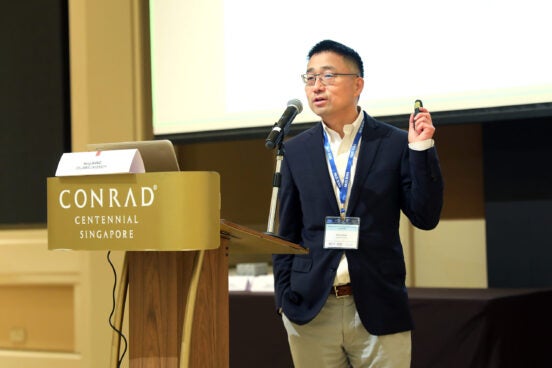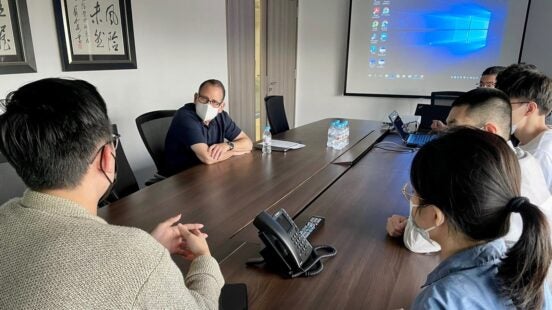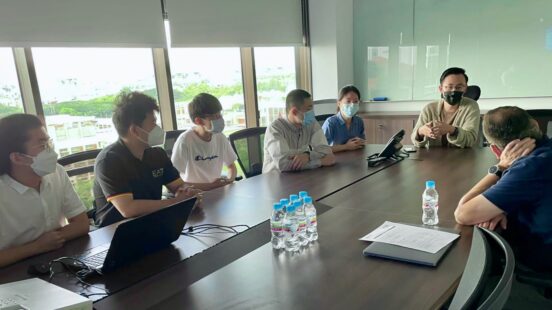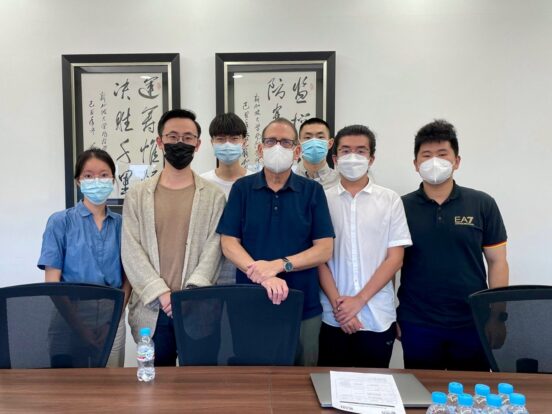|
| |
NUS RMI Hosts the Fifteenth Annual Risk Management Conference
By Huang Zihao, MFE Student, August 2022 Cohort
|
|
| |
Inflation, Crypto, and Climate Risk: these are things that have been making the news recently. The fifteenth Annual Risk Management Conference took place from 2 to 3 August 2022, marking halfway through the second decade of RMI successfully hosting such an international forum. The first day was the Risk and Credit Portfolio Management Workshop jointly organized by IACPM and RMI. The morning sessions began with an economic outlook on global geopolitics, inflation, supply chain, and views on ASEAN. Following the sessions on Evolving Organizational Priorities and Deciphering the Complexity of Climate in Risk Management. The sessions in the afternoon continue to “Transforming Markets and Credit Portfolio Management in Loans, Structured Credit, and Private Credit Risk Insurance”, as well as the topics in the Future of Sustainability. On 3 August, the second day of the conference was held at Conrad Centennial Singapore. The conference featured discussions in the areas of economic activity post-pandemic, climate change, net-zero, financial risk management, innovations in data analytics, etc. In addition, the afternoon of the conference also featured presentations on recent theoretical developments, analytical techniques, and empirical findings in the field of risk management. RMI’s Director and Professor of Economics, Prof. Chen Yi-Chun welcomed the crowd with a few opening remarks before introducing the distinguished guest and keynote speaker, Prof. Martin Eichenbaum. Prof. Martin Eichenbaum is the Charles Moskos Professor of Economics and the Co-Director of the Center for International Economics and Development at Northwestern University. His talk focused on "Expectations, Infections, and Economic Activity", which identified some interesting connections between the pandemic and recent inflation. Insights included how the pandemic reshaped the expectations of households and made it difficult to stimulate spending during the pandemic. As a result, a lot of stimulus went unspent at the household level until later in the event.
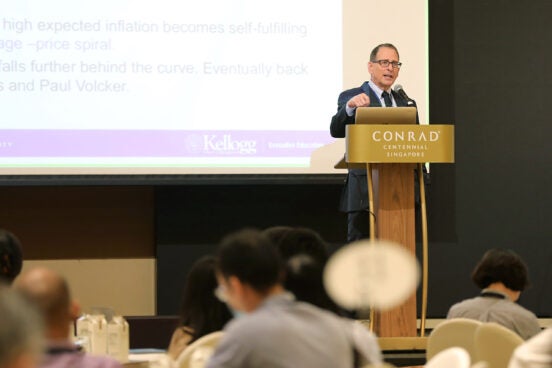
After a short coffee break, the first panel discussed "Climate Change, Net-Zero, and the Practice of Financial Risk Management". This panel featured Ms. Krista Baetens, Executive(Asia), Corporate and Institutional Banking at National Australia Bank, Dr. David Smith, Senior Investment Director at abrdn, and Mr. Benjamin Wong, Managing Director and Head of Group Portfolio Analytics at DBS Bank. The session was chaired by RMI’s Adjunct Professor, Mr. Lutfey Siddiqi who led the discussion on risk management challenges for the financial system as a result of climate change. Highlights from this session included the the conceptualization of climate risk as a 'long-run-risk', and interesting trade-offs when managing this risk: there may be additional risks when transitioning to green energy, as evidenced by recent power crises in the developed world. Subsequently, the day progressed onto the second panel, co-organized by RMI and International Association of Credit Portfolio Managers (IACPM), focused on the next generation data and analytics in APAC, alternative data sources for credit risk identification and assessment, and Development of innovative early warning indicators across geographies and asset classes. This session began with Mr. Mikko Lehtonen, Senior Expert at McKinsey & Company, sharing results of IACPM McKinsey Benchmarking Study about data analysis in practice and lessons learned from COVID. Then it followed by a panel discussion, which featured Dr. Davide Crippa, Chief Risk Officer Singapore at Maybank, Mr. Edwin Lee, Head of Risk Appetite and Strategy at OCBC Bank, and chaired by Marcia Banks, Deputy Director at IACPM. A common theme was the emerging demand for big data and machine learning.
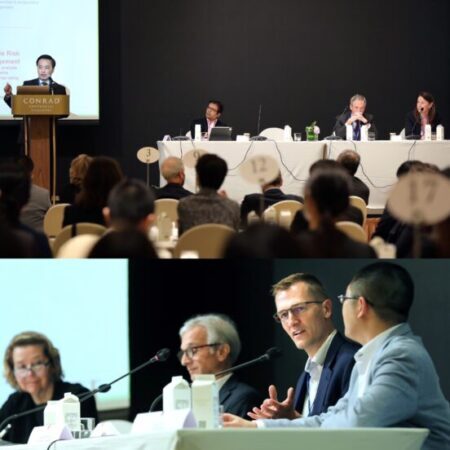
After lunch, Prof. Wang Neng, Chong Khoon Lin Professor of Real Estate and Finance at Columbia University kick-started the Scientific Program with his plenary talk on “A p Theory of Government Debt and Taxes”. In this paper, prof. Wang makes a salient connection between the management of government debt, and the classical 'q-theory' of investments for modeling firms. The second half of the day broke into four tracks with three contributed session hosted and chaired respectively by Assoc Prof. Chen Ying, Assoc Prof. Zhou Chao, and Asst Prof. Sungjune Pyun. Three Semi-Plenary talks held respectively in each session by Prof. Wolfgang Karl Haerdle from Humboldt-Universität zu Berlin, Prof Mathieu Rosenbaum from Ecole Polytechnique, and Prof. Rossen Valkanov from Rady School of Management, UC San Diego.
|
|
|
| |
For some speakers, it was their first time presenting in Asia. One such speaker was Roy Chen-Zhang from UNC, who presented a paper called 'Yield Farming'. In his paper, Roy and coauthors examine the underlying issues surrounding cryptocurrency lending for market-making, a practice called 'yield farming', which promises upwards of 300% annualized returns for lenders. However, he argues that investors are subject to behavioural biases and mistakes in execution that prevents most investors from earning the advertised return. I spoke with Roy after his talk, critical topics include sensationalism and trend-following/herding bias in markets. Such complexity make it hard to accurately assess investment products. Therefore it’s important to encourage young researchers in risk and finance, especially at top universities, as they have new ideas and a way of looking at the world. The scientific paper presenters featured renowned researchers from prestigious universities, such as, Chinese University of Hong Kong, Católica-Lisbon School of Business and Economics, Erasmus University Rotterdam, Hong Kong University of Science and Technology, Monash Business School, National University of Singapore, Singapore Management University, University of North-Carolina at Chapel Hill, University of Florence, Université de Paris, and University of New South Wales, among others. Launched in 2007, the Conference has grown to a regional platform that brings together policy makers, leaders from the industry, regulators, and internationally renowned academic to enhance their risk management techniques, explore the latest investment strategies and manage the fundamental regulatory changes in the financial sector. |
|
| |
An Interview with Prof. Martin Eichenbaum
By Zhao Zhun, MFE Student, August 2022 Cohort
|
|
|
| |
Professor Martin Eichenbaum was invited by RMI to its Annual Risk Management Conference in August 2022. One day before the Conference, a group of NUS MFE Students interviewed Professor Martin Eichenbaum, and had a one-hour discussion about risk management and financial regulations. Here is the summary of the interview. Biography Martin Eichenbaum is the Charles Moskos Professor of economics and co-director of the Center for International Economics at Northwestern University. He serves as the consultant to the Federal Reserve Bank of San Francisco. He completed his PhD (Economics) from The University of Minnesota in 1981, and then joined Carnegie Mellon University as Assistant Professor of Economics (1981-1985), Associate Professor of Economics (1985-1987), and became the Professor in Economics at Northewestern University (1988-present). Martin Eichenbaum’s research focuses on Macroeconomics, International Economics, monetary theories and policies. He is currently the co-editor of the NBER Macro Annual. He was co-editor of the American Economic Review as well as an associate editor of the Journal of Monetary Economics, the American Economic Journal - Macro, and the Journal of Money, Credit and Banking. He is a fellow of the American Academy of Arts and Sciences, a fellow of the Econometric Society, a Research Associate of the NBER. |
|
| |
(Figure 1: Students are interviewing Professor Eichenbaum at RMI)
Q&A Q1:How is risk management different today than before? A1: The risks that financial industries face are unusual now, and different than before. One is cybersecurity, which is evolving so rapidly. We have smart systems all around us, improving our efficiency but they expose us to the tail risks. Almost any modern financial companies are tech platforms. If they go down, the outcome is catastrophic. When you find out how many times a bank is attacked a day, the number will make your hair stand. Another big issue is climate, which I know sounds funny. But trust me, there's a huge demand from governments to evaluate this kind of risks. One concrete application is insurance. There was a bad year for the bank I was from in terms of claims for floods. Usually we raise the premium after that. This is all assuming that the probabilities are constant. But that’s not the right assumption anymore. Now we are facing uncertainties and then the question is, how do you manage that as financial institution? Q2: What are the central banks’ role in managing these unusual risks? A2: It is very controversial. I'll just say that central banks should have a pretty narrow mission. Nobody elected central bankers to make hard political, social, ethical decisions. So if they confine themselves to regulation, they do supposed to regulate for risk. And if that's part of their regulatory role, they see that same: a bank is not changing the risk models for flooding, for heat, extreme weather, etc, then they are definitely miserable. But I think it should be very careful not to overstep their mandate and enter political decisions. That's best left to the political process. But there's definitely a role in terms of regulation. Here's an example of a risk in Canada. The government changed the law that said, if an oil company goes broke, the first slice of assets has to go to fixing the environment. Which means if I'm lending to an oil company, my policies must change because if the company fails, bankruptcy will now mean differently. And the risk managers have to come in and change the probabilities and have to talk to the climate experts about the associated costs. So even leaving beside ethics, climate change is big deal as a business decision, which makes regulations necessary. Q3: A lot of your works are on Israel. What are the similarities and differences between Israel and Singapore? A3: There really some striking similarities and differences between Israel and Singapore. Singapore does not have a lot of natural resources. Neither is Israel, although it did discover some natural gas. Singapore can't rely upon nature to develop, and Israel is very much like that. But in some ways, Israel's a little bit easier, because of tourism. It's a very natural industry for them, because of their location and history in the West. Another similarity is that, both Singapore and Israel are subject to the geopolitical risk. Israel is in a bad neighbourhood. Similarly, if there was conflict in the region, it would have incredible consequences for Singapore. And that's a different kind of tail risk. And I'm not sure how the government manages that. In terms of regulation, the Israel government is very involved on security issues, but everything else is very laissez faire. Singapore, on the other hand, is much more regulated in various dimensions.
|
|
| |
(Figure 2: Students are interviewing Professor Eichenbaum at RMI)
Q4. What regulations do you think did not work so well during Covid? A4: By the International Accounting Standards, all the banks have to each quarter project what they will lose on loans. And that enters into their current profits. So the risk have to project their losses. It's a good exercise. But think about the interaction of risk management and the stock market. There's obviously huge standard errors on any projection. I've never been convinced that it should be part of the regular accounting statement. At the beginning of COVID, everybody was very concerned and conservative. So they had all these write offs. But then as time goes on, the probabilities changed, so they took some of them back. Therefore, you get big swings in profits that are unrelated to anything that actually happened. Q5. How effective the Basel III is in terms of regulations? A5: The whole Basel process has made the banks safe, unambiguously. However, the market has dealt with those regulations by moving a lot of transactions from the banks to actors are less regulated. So there's a lot of risk out there. So here's one example. Suppose customers go to a Home Depot, sometimes they need to take loans. In the olden days, they would go to a bank to get a loan beforehand. Now, there are FinTech companies. When the customers go to the Home Depot, FinTech companies give you a loan on the spot. But where does the money come from? From banks. But the regulations call those loans something different. They're treated differently if the bank directly lend to the consumer, as opposed to lend FinTech companies then lend to the consumer. That’s an example of regulatory arbitrage. So in essence Basel III helps. But there's always this danger that things moving off the system. And we don't know how much is really off the system. During the one-hour interview, Professor Eichenbaum shared his thoughts on the challenges in risk management and regulations from a practitioner and central banker’s point of view. The most impressive take-away was his sharing on risks associated with climate change, which I do not actually feel about in Singapore. From Professor Eichenbaum’s sharing, I realise climate change is not solely an idea for ESG but also a real business issue, associated with costs and finance. He also provides with real world examples to help us make sense of the key issues. I hope our faculty can organise more of such events. It is a great opportunity for us to learn and grow! |
|
| |
(Figure 3: Group photos of Professor Eichenbaum with students at RMI) |
|
|


